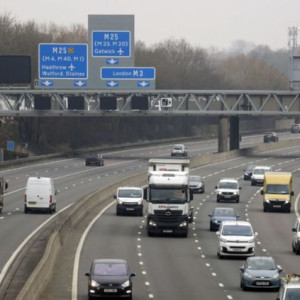Smart motorway safety fears as drivers’ say ‘incredibly dangerous and anxiety-inducing’

A third of drivers feel a lot less safe on any form of smart motorway than they did three years ago, according to a new AA survey. Motorists have branded them "incredibly dangerous and anxiety-inducing", while two-thirds felt safer on a traditional motorway. It comes after eight-year-old Dev Naran was killed after a lorry ploughed into the back of his granddad's car on the M6.
The pair, who had visited his disabled brother in a Birmingham[1] hospital, had been forced to stop on a smart motorway with the hard shoulder being used as a live motorway lane on May 31, 2018. The fourth annual safety Stocktake[3], due to be published last year, has yet to be released - but the AA is calling for the report to be published urgently. The survey of more than 13,500 drivers found motorways where the hard shoulder can be switched on and off at peak times to create an additional running lane caused the highest number of respondents to say they did not feel safe.
 Current smart motorways include the M1, M6 and M25, as well as the M60, and M42 - but motorists using them have been warned.
Current smart motorways include the M1, M6 and M25, as well as the M60, and M42 - but motorists using them have been warned.
One respondent told the AA: "I believe smart motorways are incredibly dangerous." Another said: "I do not think I would feel safe if I broke down on one", with one driver stating: "They are anxiety-inducing."
Others said Motorway Incident Detection and Automatic Signalling - sensors designed to alert motorway monitoring staff to traffic flow and average speeds - did not work, and taking away the hard shoulder was a bad idea. The AA said the results underlined the fear people felt towards driving on smart motorways. It was found 60 per cent of drivers wanted the existing smart motorway network converted back to the traditional three running lanes with a permanent hard shoulder.
Just 11 per cent said the network should be left in its current state; nine per cent said all running lane systems should be converted to "dynamic hard shoulder" schemes and 14 per cent said they should be turned into "controlled motorways". These figures are broadly in line with the results of a similar survey carried out by The AA in 2023. That was just after the then-Conservative Government announced there would be no further smart motorways built in England.
What are the types of motorways?
- Conventional - motorway with a continuous hard shoulder.
- 'All Lanes Running' where there is no hard shoulder but emergency laybys at varying intervals. This is the most common type of 'smart' motorway.
- 'Dynamic Hard Shoulder' where the hard shoulder is only used as a running lane during peak hours or high levels of congestion.
- 'Controlled Motorways' where there is a permanent hard shoulder, but gantries which enforce lower speed limits.
The AA has been raising concerns about smart motorways since their introduction in 2010 and believes they should be scrapped. At least 79 people have been killed on 'smart' motorways between 2010 and 2024.
The AA said figures suggested drivers breaking down on a 'smart' motorway without a hard shoulder were three times more likely to be killed or seriously injured than on one with a hard shoulder. The AA's Motoring Manifesto[4], published just before the election, highlighted how AA members felt about smart motorways. Previously it was revealed that more than a third of drivers said they did not use the inside lane due to fear of broken-down vehicles ahead.
In an attempt to make the existing smart motorways safer, in 2020, the previous government pledged just under GBP1bn to improve safety on the network. This includes building 150 more emergency areas[5] at the side of smart motorways to bring down the distance between them from 1.5 miles to 0.75. Around half of these schemes have been completed with half still under construction, including on sections of the M1; M3; M4; M5; M20 and M25.
Jack Cousens, head of roads policy for The AA, said: "Given the choice between 'smart' motorways relying on technology or motorways with a hard shoulder, drivers are clear which they prefer. "In the last few years, there have been numerous reports of signal outages and CCTV failures across the network. It is vital the overdue Stocktake is released so we can understand the impact of these technical failures.
"More emergency areas will help, but drivers are frustrated with the perceived lack of urgency to complete the work.
While many upgrades have been completed, there are several major motorways that only began work last year.
"Both The AA and drivers say this experiment has failed and urge for the reinstatement of a permanent hard shoulder."
References
- ^ Birmingham (www.birminghammail.co.uk)
- ^ New Birmingham Airport car park system starting this month (www.birminghammail.co.uk)
- ^ Stocktake (nationalhighways.co.uk)
- ^ Motoring Manifesto (go.skimresources.com)
- ^ 150 more emergency areas (nationalhighways.co.uk)